

Tri-Council Policy Statement: Ethical Conduct for Research Involving Humans – TCPS 2 (2018) Ethics Resources - CIHR. This section includes a limited bibliography of relevant ethics guidelines, policies, regulatory documents, and websites that users may find helpful.
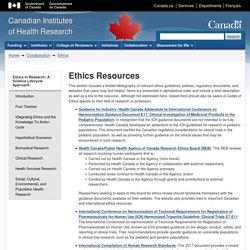
Items are presented in alphabetical order and include a brief description as well as a link to the resource . Although not addressed here, researchers should also be aware of Codes of Ethics specific to their field of research or profession. Guidance for Industry: Health Canada Addendum to International Conference on Harmonisation Guidance Document E11: Clinical Investigation of Medicinal Products in the Pediatric Population: In recognition that the ICH guidance documents are not intended to be fully comprehensive, Health Canada developed an addendum to the ICH guidelines for research in pediatric populations.
This document clarifies the Canadian regulatory considerations for clinical trials in the pediatric population, as well as providing further guidance on the ethical issues that may be encountered in such research. Clinical Research Regulation For Canada. Overview Per the CA-ICH-GCPs, the sponsor should implement a system to manage quality throughout all stages of the trial process, focusing on trial activities essential to ensuring participant protection and the reliability of trial results.
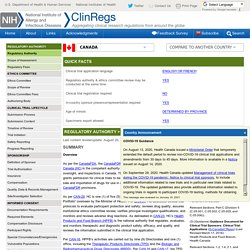
Note that per HCNotice-CA-ICH-GCPs, Health Canada (HC)-implemented International Council for Harmonisation (ICH) guidance takes precedence over other HC guidance when they are not consistent. The quality management system should use a risk-based approach that includes: As stated in the CanadaFDR and the CA-ICH-GCPs, the sponsor is responsible for implementing and maintaining quality assurance (QA) and quality control (QC) systems with written standard operating procedures (SOPs) to ensure that trials are conducted and data generated, recorded, and reported in compliance with the protocol, the CA-ICH-GCPs, and the applicable regulatory requirements. For HC’s interpretation of the relevant provisions of the CanadaFDR, see the G-FDR-0100. Guidance Document: Part C, Division 5 of the Food and Drug Regulations “Drugs for Clinical Trials Involving Human Subjects” (GUI-0100) - Summary. FOIP - Freedom of Information and Protection of Privacy: This website provides information to help public bodies comply with Alberta's Freedom of Information and Protection of Privacy Act (FOIP Act).
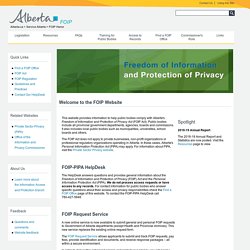
Public bodies include all provincial government departments, agencies, boards and commissions. It also includes local public bodies such as municipalities, universities, school boards and others. The FOIP Act does not apply to private businesses, non-profit organizations or professional regulatory organizations operating in Alberta. In these cases, Alberta's Personal Information Protection Act (PIPA) may apply. For information about PIPA, visit the Private Sector Privacy website. Myhealthrecords. Fs01_canada_health_act_june_2000_e. Research and Innovation Act - Open Government. Funding overview - CIHR. Research Grants in Canada - GrantWatch.
Funding Opportunities. AHS is committed to supporting research and innovation of highest value to Albertans.
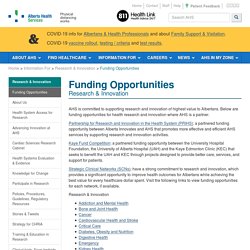
Below are funding opportunities for health research and innovation where AHS is a partner. Partnership for Research and Innovation in the Health System (PRIHS): a partnered funding opportunity between Alberta Innovates and AHS that promotes more effective and efficient AHS services by supporting research and innovation activities. Kaye Fund Competition: a partnered funding opportunity between the University Hospital Foundation, the University of Alberta Hospital (UAH) and the Kaye Edmonton Clinic (KEC) that seeks to benefit the UAH and KEC through projects designed to provide better care, services, and support for patients.
Strategic Clinical Networks (SCNs): have a strong commitment to research and innovation, which provides a significant opportunity to improve health outcomes for Albertans while achieving the best value for every healthcare dollar spent. SOCRA The Society of Clinical Research Associates, Inc. Regulatory documents - Canadian Nuclear Safety Commission. Regulatory documents generally present both requirements and guidance in a single document and distinguish between both through the use of mandatory (e.g., shall, must) and non-mandatory (e.g., should, may) language.
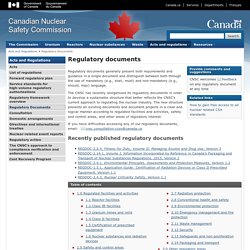
The CNSC has recently reorganized its regulatory documents in order to develop a sustainable structure that better reflects the CNSC's current approach to regulating the nuclear industry. The new structure presents all existing documents and document projects in a clear and logical manner according to regulated facilities and activities, safety and control areas, and other areas of regulatory interest. If you have difficulties accessing any of our regulatory documents, email: cnsc.consultation.ccsn@canada.ca Recently published regulatory documents 1.0 Regulated facilities and activities The documents in this category are organized according to the type of regulated facility or activity. This category includes: 1.1 Reactor facilities 1.2 Class IB facilities 2.1 Management system. Canadian Association of Medical Radiation Technologists. The CAMRT Member Code of Ethics and Professional Conduct has been developed by members and endorsed by the Board of Directors to articulate the ethical behaviour and responsible conduct expected of all CAMRT members.
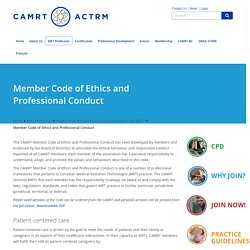
Each member of the association has a personal responsibility to understand, adopt, and promote the values and behaviours described in this code. The CAMRT Member Code of Ethics and Professional Conduct is one of a number of professional frameworks that pertains to Canadian Medical Radiation Technologist (MRT) practice. The CAMRT reminds MRTs that each member has the responsibility to always be aware of and comply with the laws, regulations, standards, and codes that govern MRT practice in his/her particular jurisdiction (provincial, territorial, or federal).
ALARA Training - Radiation Safety Institute of Canada. Loading...
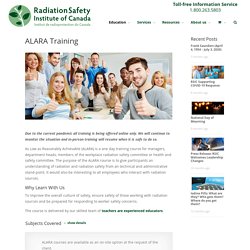
Due to the current pandemic all training is being offered online only. We will continue to monitor the situation and in-person training will resume when it is safe to do so. As Low as Reasonably Achievable (ALARA) is a one day training course for managers, department heads, members of the workplace radiation safety committee or health and safety committee. ACMDTT – Alberta College of Medical Diagnostic and Therapeutic Technologists.